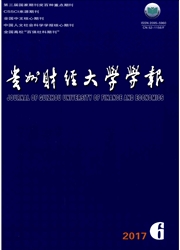

 中文摘要:
中文摘要:
金融资源的自由流动与集聚带来了金融的规模效应,降低了企业的融资成本,促进区域全要素生产率的提升,但是资本的逐利驱动也进一步导致区域经济发展的不均衡。随着区域间经济交易活动往来的日趋频繁,全要素生产率(TFP)的空间溢出效应越发明显。通过收集我国30个地区市(2006—2015)的截面数据,展开金融发展对全要素生产率直接效应和溢出效应的研究,从而优化金融在区域间的配置效率。为如何协调区域金融、经济均衡发展提供政策的建议和参考。
 英文摘要:
英文摘要:
The free flow of financial resources and financial agglomeration brings the scale effect, reduce financing costs, promote regional TFP increase, but profit driven capital also lead to the unbalanced development of the regional economy. With the increasing frequency of inter regional economic transactions, the spatial spillover effect of total factor productivity (TFP) is becoming more pronounced. Then, how financial development directly affects TFP and its spatial spillover effects is a question to ponder over. This paper through the collection of 30 regions in China, (2006 - 2015 ) of the cross section data, research on the direct effect of financial development on TFP and spillover effects, so as to optimize the financial allocation efficiency between regions. Put the TFP decomposition and constructed by the BLIVI index, and then study the banking agencies and the capital market to the " technical progress" and " direct and indirect effects of efficiency improvement" , we find that there exists a positive direct effect on TFP, but the capital market (stocks and bonds) on regional total factor productivity spillover effect ratio of banks and other financial media is more significant, which can efficiently generate information transfer and technical disclosure and stimulate R & D on competition and catch up, further promote the balanced development of regional play. Finally, it provides policy advice and reference on how to coordinate regional financial and economic balanced development.
 同期刊论文项目
同期刊论文项目
 同项目期刊论文
同项目期刊论文
 期刊信息
期刊信息
